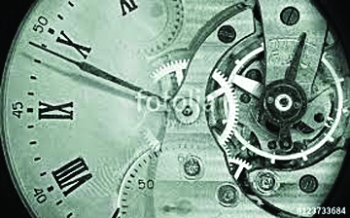
By Charles Harris
The Empire Group and The Emery Village Voice invite readers ask Charles Harris questions regarding watches, clocks or anything that keeps time.
Charles is the President of the Empire Group, a local Emery business, and is considered one of Toronto’s most knowledgeable aficionados and scholars of horology.
Question 1:
Dear Charles, My wife has inherited her parent’s Grandfather clock, however, a friend of mine has told me that it is in fact not a Grandfather clock but a Grandmother clock. What is the difference?
Mike
Dear Mike,
That is actually an interesting question.
The term Grandfather Clock is a pop culture term that comes from the folk song My Grandfather’s Clock, a song (allegedly) written in 1876 by Henry Clay Work.
The song is responsible for the common name Grandfather Clock, for what are properly called “longcase clocks” however. Within North American culture a Grandfather Clock usually refers to a large floor model clock and a Grandmother Clock usually refers to a smaller version of a floor model clock.
And as an interesting side note to your question, I will be launching next year “Charles Harris Timepieces” Canada’s new clock line. In it will be a line of miniature floor models. These have not been available for almost 100 years. Thanks for your question.
Question 2:
Dear Charles, What is the difference between a mineral crystal and a regular crystal? I just want a crystal that won’t scratch.
Dave
Dear Dave,
Regular crystals are in fact mineral crystals. Mineral crystals are pieces of glass that have been heat treated so the surfaces are harder than regular glass. That being said they are still easily scratched. If you want a crystal that resists more scratches, then you are looking for a “sapphire” crystal. However they are only available on specific models and are considerably more expensive than standard crystals.
Thanks for your question.
Question 3:
Dear Charles, I have been looking at buying myself a really good watch. I have seen that “perpetual calendar” models are much more expensive. What exactly are perpetual calendars and why are they so expensive?
Amit
Dear Amit,
Regular calendar model watches need to be corrected every month between 30 and 31 day months, not to mention leap years.
A perpetual calendar watch automatically corrects the date on the watch for both 30 and 31 day month and also corrects the date for leap years.
As I am sure you can imagine the mechanism to do this is very complicated and difficult to manufacture. There are only a few manufacturers that offer this complication on their watches. This is the reason why the watch is very expensive, however, to own such a fine mechanism is not unlike owning a Ferrari or a Lamborghini.
Thanks for your question.
I want to thank all of you for submitting your questions. Until next month...Charles
Email Harris at: Charles@theempiregroup.ca or call (416) 740-4445. The Empire Group is located at 134 Fenmar Drive in Toronto.













